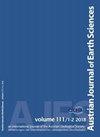乌克兰第聂伯-顿涅茨盆地泥盆系和石炭系页岩矿物学及相变化
IF 1.1
4区 地球科学
Q2 Earth and Planetary Sciences
引用次数: 3
摘要
摘要对乌克兰第聂伯-顿涅茨盆地泥盆系—石炭系页岩进行了矿物学研究。这些页岩在垂向和横向上均表现出较高的成分变异性。此外,发现地层趋势受气候因素和内陆碎屑输入变化的控制。图尔尼斯组和部分下维桑组高岭石含量高且高岭石优势于伊利石,可能是泥盆纪/图尔尼斯组边界的Hangenberg气候事件引起的强烈化学风化作用的结果。而盆地中心的上Visean和Serpukhovian样品中高岭石含量异常高,可能是由于高岭石和伊利石的输运性质不同,导致小碎屑高岭石颗粒选择性富集,扫描电镜观察显示,这些颗粒通常在亚微米范围内。对于含有大量这两种粘土矿物的样品,K/Al元素比值与伊利石/高岭石比值具有良好的相关性,从而可以根据大量地球化学数据对相对高岭石含量进行预评估。由于高岭石被认为会降低页岩的易碎性,并对其润湿行为有很大的影响,这对勘探目的是有用的信息。泥盆纪和图尔奈世样品中较高的长石含量,特别是沿东北盆地边缘和DDB的西北浅层部分,可能与DDB活动裂谷阶段(及之后不久)岩浆前体(如沃罗涅日地块)的碎屑输入增加有关。总体而言,盆地近端长石含量高于盆地中心,这可能是较大长石颗粒输运距离较短的结果。最后,在6 km深度下存在可膨胀粘土矿物,并且在这些深度下没有可见的热成熟度趋势,这证明了DDB存在低沉积后热流。这与镜质组反射率测量和热模拟结果一致,表明中生代热流较低。本文章由计算机程序翻译,如有差异,请以英文原文为准。
Mineralogy and facies variations of Devonian and Carboniferous shales in the Ukrainian Dniepr-Donets Basin
Abstract The mineralogy of Devonian to Carboniferous shales from the Ukrainian Dniepr-Donets Basin (DDB) was investigated during this study. These shales show a high compositional variability in vertical and lateral directions. Furthermore, stratigraphic trends were found to be controlled both by climatic factors as well as by changing detrital input from the hinterland. High kaolinite contents and predominance of kaolinite over illite in the Tournaisian and partly in the lower Visean units are likely a result of intense chemical weathering related to the Hangenberg climatic event at the Devonian/ Tournaisian boundary. In contrast, abnormally high kaolinite contents in upper Visean and Serpukhovian samples at the basin center might be caused by different transport properties of kaolinite and illite, leading to selective concentration of small detrital kaolinite particles, which are often in the sub-micrometer range according to scanning electron microscopy observations. K/Al elemental ratios correlate well with illite/kaolinite ratios for samples in which significant amounts of both clay minerals are present, which enables a pre-evaluation of the relative kaolinite content based on bulk geochemical data. As kaolinite is suggested to decrease the fraccability of shales and to have a great influence on their wetting behaviour, this is useful information for explorational purposes. Higher feldspar contents in Devonian and Tournaisian samples, especially along the NE basin margin and in the shallow NW part of the DDB, are likely related to increased detrital input from magmatic precursors (e.g. in the Voronezh Massif ) during (and shortly after) the active rift stage of the DDB. In general, feldspar contents are higher in proximal positions compared to the basin center, which is likely a result of shorter transport distances of the comparably large feldspar grains. Finally, the presence of expandable clay minerals down to depths of 6 km and the fact that no thermal maturity trend is visible down to these depths, proves, that a low post-depositional heat flow was present in the DDB. This is in good agreement with vitrinite reflectance measurements and thermal modelling results from previous studies, which suggest a low Mesozoic heat flow.
求助全文
通过发布文献求助,成功后即可免费获取论文全文。
去求助
来源期刊

Austrian Journal of Earth Sciences
Earth and Planetary Sciences-Paleontology
CiteScore
3.10
自引率
0.00%
发文量
0
审稿时长
>12 weeks
期刊介绍:
AUSTRIAN JOURNAL OF EARTH SCIENCES is the official journal of the Austrian Geological, Mineralogical and Palaeontological Societies, hosted by a country that is famous for its spectacular mountains that are the birthplace for many geological and mineralogical concepts in modern Earth science.
AUSTRIAN JOURNAL OF EARTH SCIENCE focuses on all aspects relevant to the geosciences of the Alps, Bohemian Massif and surrounding areas. Contributions on other regions are welcome if they embed their findings into a conceptual framework that relates the contribution to Alpine-type orogens and Alpine regions in general, and are thus relevant to an international audience. Contributions are subject to peer review and editorial control according to SCI guidelines to ensure that the required standard of scientific excellence is maintained.
 求助内容:
求助内容: 应助结果提醒方式:
应助结果提醒方式:


